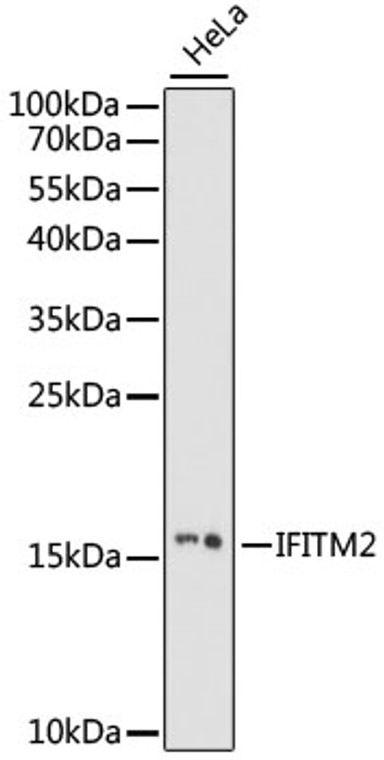| Host: |
Rabbit |
| Applications: |
WB |
| Reactivity: |
Human |
| Note: |
STRICTLY FOR FURTHER SCIENTIFIC RESEARCH USE ONLY (RUO). MUST NOT TO BE USED IN DIAGNOSTIC OR THERAPEUTIC APPLICATIONS. |
| Short Description: |
Rabbit polyclonal antibody anti-IFITM2 (1-100) is suitable for use in Western Blot research applications. |
| Clonality: |
Polyclonal |
| Conjugation: |
Unconjugated |
| Isotype: |
IgG |
| Formulation: |
PBS with 0.01% Thimerosal, 50% Glycerol, pH7.3. |
| Purification: |
Affinity purification |
| Dilution Range: |
WB 1:500-1:2000 |
| Storage Instruction: |
Store at-20°C for up to 1 year from the date of receipt, and avoid repeat freeze-thaw cycles. |
| Gene Symbol: |
IFITM2 |
| Gene ID: |
10581 |
| Uniprot ID: |
IFM2_HUMAN |
| Immunogen Region: |
1-100 |
| Immunogen: |
A synthetic peptide corresponding to a sequence within amino acids 1-100 of human IFITM2 (NP_006426.2). |
| Immunogen Sequence: |
MNHIVQTFSPVNSGQPPNYE MLKEEQEVAMLGVPHNPAPP MSTVIHIRSETSVPDHVVWS LFNTLFMNTCCLGFIAFAYS VKSRDRKMVGDVTGAQAYAS |
| Post Translational Modifications | Palmitoylation on membrane-proximal cysteines controls clustering in membrane compartments and antiviral activity. Phosphorylation at Tyr-19 is required for endosomal and lysosomal location. |
| Function | IFN-induced antiviral protein which inhibits the entry of viruses to the host cell cytoplasm, permitting endocytosis, but preventing subsequent viral fusion and release of viral contents into the cytosol. Active against multiple viruses, including influenza A virus, SARS coronaviruses (SARS-CoV and SARS-CoV-2), Marburg virus (MARV), Ebola virus (EBOV), Dengue virus (DNV), West Nile virus (WNV), human immunodeficiency virus type 1 (HIV-1), hepatitis C virus (HCV) and vesicular stomatitis virus (VSV). Can inhibit: influenza virus hemagglutinin protein-mediated viral entry, MARV and EBOV GP1,2-mediated viral entry, SARS-CoV and SARS-CoV-2 S protein-mediated viral entry and VSV G protein-mediated viral entry. Induces cell cycle arrest and mediates apoptosis by caspase activation and in p53-independent manner. In hepatocytes, IFITM proteins act in a coordinated manner to restrict HCV infection by targeting the endocytosed HCV virion for lysosomal degradation. IFITM2 and IFITM3 display anti-HCV activity that may complement the anti-HCV activity of IFITM1 by inhibiting the late stages of HCV entry, possibly in a coordinated manner by trapping the virion in the endosomal pathway and targeting it for degradation at the lysosome. |
| Protein Name | Interferon-Induced Transmembrane Protein 2Dispanin Subfamily A Member 2cDspa2cInterferon-Inducible Protein 1-8d |
| Database Links | Reactome: R-HSA-909733 |
| Cellular Localisation | Cell MembraneSingle-Pass Type Ii Membrane ProteinLysosome MembraneLate Endosome Membrane |
| Alternative Antibody Names | Anti-Interferon-Induced Transmembrane Protein 2 antibodyAnti-Dispanin Subfamily A Member 2c antibodyAnti-Dspa2c antibodyAnti-Interferon-Inducible Protein 1-8d antibodyAnti-IFITM2 antibody |
Information sourced from Uniprot.org
12 months for antibodies. 6 months for ELISA Kits. Please see website T&Cs for further guidance







